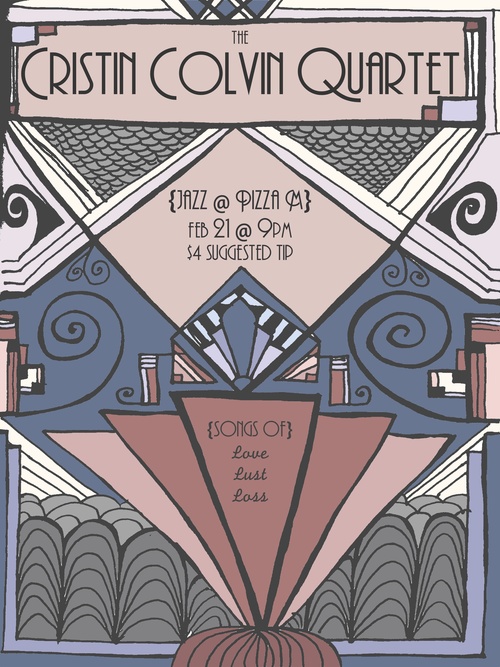If you’ve never been to Pizza M, read this interview and then go to Pizza M. Or, put down your phone and then go to Pizza M, order the pear-brie pizza, and read this interview with Cristin Colvin and Alex Falls about their musical backgrounds and the therapy of performance while you eat. They have an upcoming show with The Cristin Colvin Quartet there on Saturday. They’ll be providing jazz, and the folks at Flying Machine and Pizza M will keep your taste buds satisfied.
Smile Politely: How did you get started in music?
Cristin Colvin: I got my BA in voice and piano performance at a tiny little college in Virginia. Playing for other singers there and working in rural churches as an accompanist really taught me the value of collaboration and gave me a hunger to work with others instead of solely focusing on solo work. After singing with the Wicker Park Choral Singers in Chicago, we moved here to C-U so I could get my Master of Music in voice. The Opera Department really opened up opportunities for me to challenge myself onstage as a performer. Now that I’m an alum, I’m actually trying to start my operatic career by auditioning in the winter, vying for summer festival apprenticeships.
Alex Falls: I grew up in a musical family. My mom sang and my dad played the saxophone, along with a bunch of other instruments. I started taking piano lessons in the first grade, and started picking up other instruments along the way—playing cello in orchestra in the fourth grade, picking up the guitar and bass in high school, singing in musicals, etc.
SP: And why jazz?
Colvin: These jazz gigs in C-U are a chance for me to explore my not-so-secret passion for jazz. I’ve been enamored with the genre since discovering Miles Davis and Ella Fitzgerald in middle school, but personally felt more comfortable performing classically. After having a chance to sing some jazz at outreach events during the Castleton Festival in Virginia last summer and fall, I decided I might as well take a leap. Alex Falls, a DMA in the jazz program, is the quartet pianist and a friend of mine from when I taught at Allen Hall as a TA. He so kindly agreed to start this project with me and enlist Luke Davis on drums and Brandon Cantwell and Chris Beyt, another Allen Hall colleague, on bass.
SP: What drew you to music in the first place?
Cristin Colvin: When I was about four years old, I got Fantasia on VHS. It was my introduction to the orchestra and to classical music. Something about that video stirred a deep, unconscious desire within me. I spent years toying around at the piano before taking formal lessons. There was an insatiable need inside to form those sounds that I had heard. After two tumultuous decades of training, I may have lost that facile and visceral wonder for a more realistic understanding of the hard work that goes into creating moving melodies and harmonies. However, that awe returns while onstage; those are the wonderful, lucid moments that remind me that I’m doing the right thing with my life.
Falls: I decided I wanted to go to college to study music in high school when I got really into playing and writing contemporary music (such as Ben Folds). The big stepping stone was learning music theory, which opened up a lot of avenues for me musically.
SP: Tell me more about your fellow performers. Are they friends, too, or simply good colleagues? Roommates? Family?
Colvin: Alex Falls and I taught at Unit One in the Allen Hall dorm during our Masters programs. We’d hang out during our lunch breaks or canceled lessons, so I knew he’d be down to play. He wanted to gig more in town and I wanted a chance to sing below the staff, so it was a win-win situation. As for Luke Davis and Brandon Cantwell, we haven’t even met yet! And that’s the beauty of jazz — the ability to come together with all our skill sets and be energized by creation in the moment. It’s also quite the challenge for a classical musician. They are all students of the jazz program here at the University, so I feel so lucky that they will be playing with me!

SP: I’m an improviser, and the idea of playing jazz scares the hell out of me! What’s accessible about it?
Falls: Improvisation can be scary! But it doesn’t have to be. A big part of it is just getting out there, playing with people, and making mistakes. I also think that a big misconception about jazz is that improvising is this big, mysterious thing where musicians pull ideas out of the ether. Being a good jazz musician means learning vocabulary; learning how to play licks and phrases that you know will sound good played over certain things; and applying those ideas in different contexts. Most solos you hear are made up of many smaller, individual ideas that a musician has worked out beforehand and has pieced together spontaneously.
SP: Just like improvisational acting! You drill basic technique and scene structures, and then you put them together on the spot.
Colvin: It is scary….which is why it’s taken me a while to even work up the nerve to try and do this. In the classical world, you spend so many years learning to hone, perfect, to create a clean and even sound all through the registers. Indeed, there is artistry in shaping a phrase, but you want to be as clean as possible, and make sure your decrescendo is just so. Someone once told me that with my opera, I was more of an artisan, since I was building my singing off of centuries of performance practice and expectation. I believe there is a kernel of truth in that, but that’s not to say that classical singing is not as “artistic” an expression as jazz or that in jazz there is complete anarchy. There are guidelines within the modal scales. You know to only use or linger on chord tones and to follow the changes, etc., but there is more freedom of choice.
SP: And you always have your classical background working with you.
Colvin: Classically, I love having a Handel Aria in my audition package, because during the return I can add ornaments, arpeggiation, or even bend a note of mourning. It’s as close to jazz as you can get in terms of stylistic choices. Easing into the jazz idiom, I’ve really tried to listen to the aesthetics of the more old-school sounds. That’s the really, dare I say, bel canto line of Tony Bennett and Perry Como, the full resonance of Sarah Vaughn and Ella Fitzgerald. So, while I’m not ready to scat out another “Air Mail Special,” I feel liberated in being able to take more liberties in shaping a phrase on the return…and if it’s not perfect, that’s okay! You experimented live, and the audience is a part of that, and the very artistic thought and effort it takes to finish that phrase is in itself something. For me, it’s a nice escape.
SP: What do you escape from? Does music cover all stress or does any of it linger during a performance?
Colvin: Ah, this is getting deep! Well, I am a perfectionist, so for me to practice a kind of music-making that does not place emphasis on perfection is therapeutic and, in a way, necessary. Also, since vying for a job in opera is a game wherein the odds are statistically damning, I find that performing in a genre outside my professional one helps diffuse some of that added-on existential stress, which comes from these accoutrements of surviving as an emerging artist, and often becomes conflated with self-worth. I love singing the classical repertoire, but exploring jazz also blurs the line between what I am trained to do and how I continue to shape my adult life as an artist, whatever that may mean. And I am learning that it can mean many different things.
Falls: A lot of things stress me out, but performing is not one of them. Part of that is performing a lot. The more you put yourself out there, the easier it gets. The other thing, though, is that music is a creative outlet, and the more you put into it, the more you get back out of it. There are no natural highs better then a really good gig.
SP: I agree. How would you get that perfect high? What’s your dream session? Who would you jam with?
Colvin: Jeff Goldblum! I’m only halfway joking. In my dreams I collaborate with Laurence Hobgood, a longtime pianist who played with Kurt Elling, for most of Kurt’s career, up until a couple of years ago. I would kill to do a duet with Tony Bennett. If I could bring back the dead… Bill Evans, to play on that duet with Tony Bennett. Their albums together from the 70s are the best.
Falls: I would love to jam with Bela Fleck. He’s a fantastic and versatile musician, and he plays with all the best people, from the guys in his band like Victor Wooten and Howard Levy to some of the best artists in the world like Bobby McFerrin and Chick Corea.
You can see Cristin Colvin and Alex Falls with the other two members of The Cristin Colvin Quartet on Saturday at Pizza M. The quartet starts at 9 p.m., but you’ll want to get there earlier for some pizza. Trust me.








